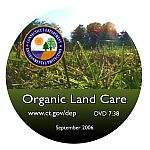Transitioning To Organic Land Care (OLC) In Your Town
- Fact Sheets on Transitioning to OLC
- Organic Land Care Video
- What Some Towns Are Doing
- Information on Pesticide Risks
- Purchasing OLC Products
- Related Topics
- Organic Lawn Care For Residents
Fact Sheets and Presentation on Transitioning to OLC
- Connecticut's Lawn Care Pesticide Ban
- Maintaining Quality Turfgrass under CT’s Lawn Care Pesticide Ban
- Moving From Conventional To Organic Turf Management, DEEP Office of Pollution Prevention presentation to UCONN's annual natural resource conference, March 2010.
Organic Land Care Video
 Are you ready to make the transition from using synthetic
(conventional) fertilizers to organic? The DEEP's Office of Pollution
Prevention has produced a 7-1/2 minute video for municipal officials who want to learn more about what it takes to "go organic." The Connecticut Chapter of the Northeast Organic Farming Association (NOFA) and the UCONN Plant Science Department provided technical expertise.
Are you ready to make the transition from using synthetic
(conventional) fertilizers to organic? The DEEP's Office of Pollution
Prevention has produced a 7-1/2 minute video for municipal officials who want to learn more about what it takes to "go organic." The Connecticut Chapter of the Northeast Organic Farming Association (NOFA) and the UCONN Plant Science Department provided technical expertise.
Video topics include:
- What is meant by organic land care
- On-location interviews with Cheshire and Granby town officials who talk about their experiences implementing organic land care on their playing fields
- Benefits and potential challenges of going organic
View the video. Read the video transcript.
Purchasing Organic Land Care Products
Some products can be purchased through the Capitol Region Purchasing Council.
What Other Towns Are Doing
DEEP partnered with NOFA to provide technical assistance to municipalities to convert to organic methods to manage their turf playing fields. DEEP and NOFA worked with Manchester and Watertown to transition from conventional pesticides and fertilizers on soccer and baseball fields.
One of the most challenging parts of moving to Organic Land Care is the cost of organic fertilizers compared with conventional ones. Utilizing "free" compost produced from town leaves is one of the best responses to this challenge. Organic land care specialists recommend that the compost be tested before application and results compared with the needs of the turf soil for nutrients, organic matter and biology.
Information on Pesticide Risks
Beyond Pesticides provides information on the risks to children who play on fields treated with conventional pesticides.
Related Topics
- Low Impact Development (LID). CT DEEP has developed a series of brochures for municipalities and homeowners who want to learn more about reducing stormwater run-off using techniques such as rain gardens, pervious pavement and more.
- Planning For Stormwater (UCONN, NEMO) Information on LID and site design elements to reduce stormwater run-off such as rain gardens, grassed swales, green roofs.
- Find out how organic land care fits into the objectives of Recommendation #36: “Reduce Use of Non-Farm Fertilizer” in the Connecticut Climate Change Action Plan.
- NOFA accreditation course on organic land care.
Pollution Prevention Strategies For State and Local Government Agencies
Content Last Updated January 2020


